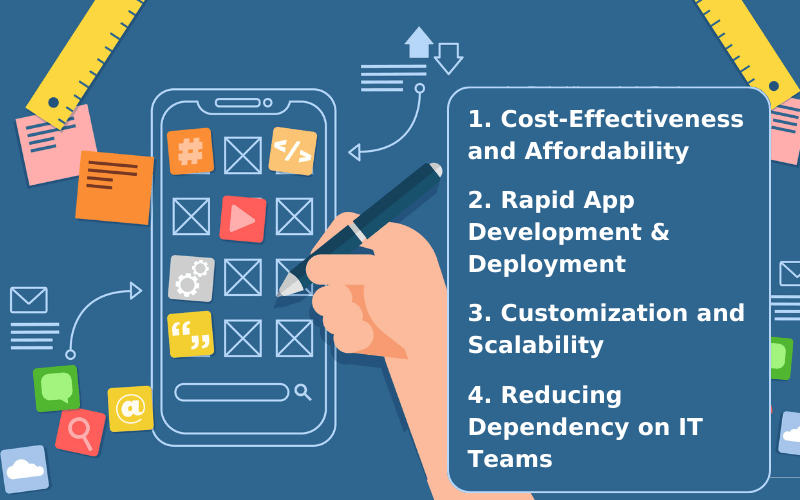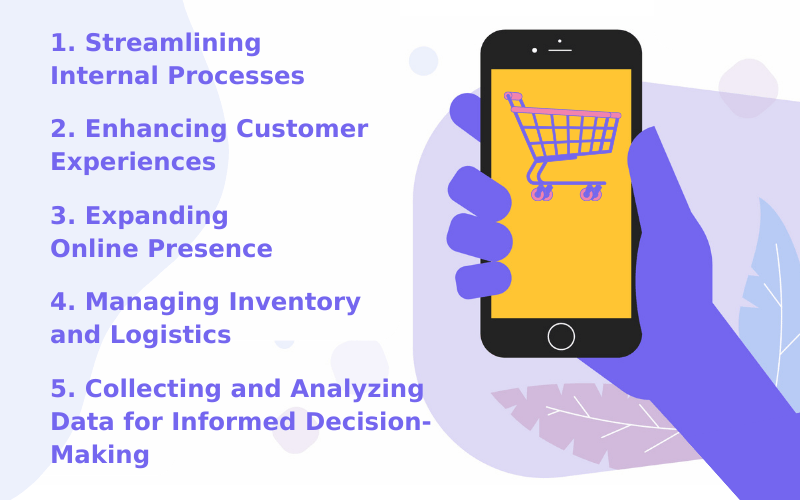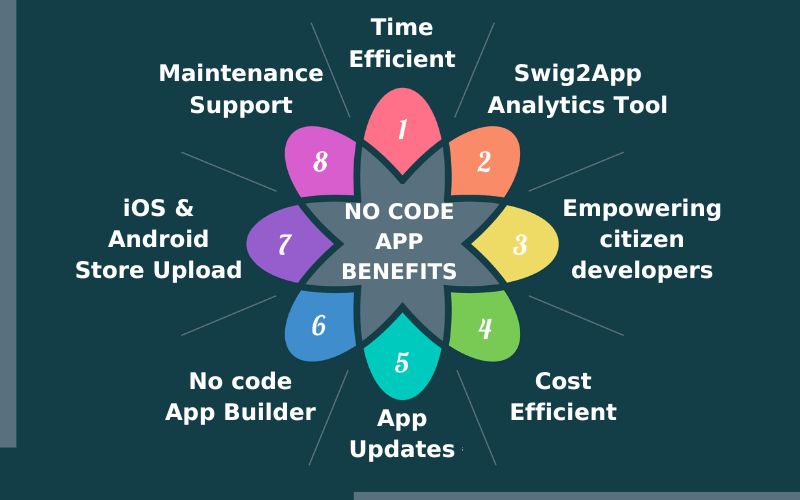Small businesses are the hub of innovation and economic vitality in the industry. The start-ups and small businesses often produce fresh ideas, products, and services to life, driving local economies and creating opportunities. However, for small businesses, the complex world of technology has often been a challenge.
In today’s digital era, technology surely provides growth and efficiency, but it comes with huge costs and complexity which can be challenging, especially for non-technical small business owners. Here comes a game-changing solution for small businesses: No-code app development.
This blog explores how no-code apps are revolutionizing small business operations and success. No-code platforms democratize technology, helping small business entrepreneurs to create custom, efficient, and scalable applications independently. No longer do businesses need to rely on IT departments or expensive development teams; with no-code apps, small business owners can bring their tech visions to life.
Join us as we journey through the world of no-code app development, uncovering its benefits, real-world use cases, and success stories. Discover the platforms reshaping small business empowerment and learn how you can embrace this digital future where entrepreneurs thrive.
UNDERSTANDING NO-CODE APP DEVELOPMENT
In this dynamic era of technology and entrepreneurship, no-code app development has revolutionized how small businesses operate and grow. So, it’s essential to understand what no-code app development is and how it differs from traditional methods to fully utilize it for your small business.
What is No-Code App Development?
No-code app development means creating software applications without the need for extensive coding or programming knowledge. It empowers individuals, including small business owners, to build apps using visual interfaces and pre-built components rather than writing lines of complex code.
How No-Code Differs from Traditional Development:
Accessibility: Traditional app development is not accessible to non-technical small business entrepreneurs as it requires expertise in coding. On the other hand, the no-code platforms are user-friendly and require no technical skill thus, they are accessible to non-technical small businesses.
Speed and Efficiency: No-code app development significantly accelerates the process of creating apps. It allows users to design, build, and publish applications in a much less time than traditional methods. Saving time is a huge benefit, especially for budding small businesses!
Democratization: No-code development has democratized the app development technology by enabling entrepreneurs and small business owners to build an app by themselves without any coding skills. This allows small businesses to focus more on innovation and service delivery.
Cost-Effectiveness: Traditional app development is usually highly costly as you need to hire skilled developers. However, the no-code app development platforms cut these expenses by eliminating the need for an IT team, making it a cost-effective solution for small businesses.
By now you have a basic understanding of no-code app development, Congratulations! You have crossed the first step to growth for small businesses. Now, let’s explore the advantages of the no-code app development approach and delve into real-world examples of how small businesses can harness its power to grow in today’s digital landscape.
ADVANTAGES OF NO-CODE APPS FOR SMALL BUSINESSES

No-code app development has emerged as a transformative force in the entrepreneurial world, offering a multitude of advantages that can reshape the way small businesses operate and compete. Here, we delve into these benefits, illustrating how no-code apps are empowering small businesses to thrive in a fast-paced, technology-driven landscape:
1. Cost-Effectiveness and Affordability:
Traditional app development is usually very costly, and ongoing app maintenance adds to it further. No-code app development significantly reduces expenses, making technology more accessible to small businesses with limited budgets.
2. Rapid App Development and Deployment:
No-code app development platforms simplify and expedite the app development process. Small businesses can go from concept to a functional app in a matter of days or weeks, allowing for quick adaptation to changing market conditions and customer needs.
3. Customization and Scalability:
No-code app development platforms offer a high degree of customization. Small businesses can tailor their apps to meet specific requirements and adapt them as their needs evolve. This scalability ensures that apps grow with the business.
4. Reducing Dependency on IT Teams:
Small businesses often lack dedicated IT departments. No-code app development platforms eliminate the need for specialized technical skills, reducing dependency on external developers or IT support and giving business owners more control.
By embracing no-code app development, small businesses can unlock a world of possibilities. They can streamline internal processes, improve customer experiences, expand their online presence, manage inventory and logistics efficiently, and make data-driven decisions. No-code apps empower small businesses to leverage technology without the traditional barriers, leveling the playing field and fueling innovation.
In the subsequent sections of this blog, we will explore real-world use cases of how small businesses benefit from no-code app development, further illustrating how this approach is reshaping the entrepreneurial landscape.
USE CASES: HOW SMALL BUSINESSES BENEFIT FROM NO-CODE APPS

Small businesses are increasingly turning to no-code app development to address a wide range of operational challenges and enhance their competitive edge. Here, we explore various use cases to shed light on how these businesses are reaping the benefits of no-code apps:
1. Streamlining Internal Processes:
Small businesses can create no-code apps to streamline internal processes such as employee onboarding, task management, and time tracking. These apps improve efficiency, reduce manual work, and free up valuable time for employees to focus on higher-value tasks.
2. Enhancing Customer Experiences:
Customer engagement is paramount for small businesses. No-code apps empower them to build customer-centric solutions like loyalty programs, appointment booking systems, and feedback collection forms. These apps create seamless interactions and strengthen customer relationships.
3. Expanding Online Presence:
In an increasingly digital world, establishing an online presence is essential. Small businesses can use no-code apps to develop e-commerce platforms, online catalogues, or booking systems, enabling them to reach a broader audience and boost sales.
4. Managing Inventory and Logistics:
Inventory management is crucial for small business and manufacturing businesses. No-code apps can help automate inventory tracking, order processing, and logistics management, reducing errors and improving supply chain efficiency.
5. Collecting and Analyzing Data for Informed Decision-Making:
Data-driven decisions are the bedrock of successful businesses. No-code apps can be tailored to collect and analyze data, providing small business owners with insights into customer behavior, market trends, and operational efficiency.
These use cases demonstrate the versatility of No-code app development platforms in addressing diverse small business needs. Breaking the shackles of complex traditional software development, small businesses can now swiftly adapt to changing circumstances, scale, and deliver greater value to customers.
Now, let’s look at some challenges that small businesses might face while using no-code app development solutions to build an app.
CHALLENGES AND CONSIDERATIONS IN NO-CODE APP DEVELOPMENT FOR SMALL BUSINESSES
While no-code app development presents a multitude of advantages, it’s essential for small businesses to be aware of the potential challenges and considerations associated with this approach:
1. Complexity of App Requirements:
No-code app development platforms excel at creating straightforward applications, but they may face limitations when it comes to complex, highly specialized apps. Small businesses with intricate app requirements may need to assess whether no-code tools can fully meet their needs.
2. Data Security and Compliance:
Handling sensitive customer data or adhering to specific industry regulations may pose challenges in a no-code environment. Small businesses must ensure that their no-code apps incorporate robust security measures and compliance protocols.
3. Scalability:
As a small business grows, its app requirements may evolve. Ensuring that a no-code app can scale effectively to accommodate increased users, data, and functionality is a critical consideration.
4. Balancing Customization with Simplicity:
While No-code app development platforms offer customization, there is a delicate balance between customization and simplicity. Overly complex apps can be challenging to maintain and use. Small businesses must carefully design their apps to avoid overwhelming users.
5. Integration with Existing Systems:
Many small businesses rely on existing software systems. Ensuring seamless integration between no-code apps and these systems may require careful planning and sometimes additional development effort.
6. Learning Curve:
No-code app development platforms are designed to be user-friendly, however, there is still a learning curve to learn the app-building platform itself. Small business owners should be prepared to invest time in getting their teams trained and familiarized with the no-code app builder platform.
7. Vendor Lock-In:
Choosing a specific No-code app development platform may result in vendor lock-in, making it challenging to migrate to another platform in the future. Small businesses should consider the long-term implications of their platform choice.
8. App Maintenance:
No-code apps require ongoing maintenance and updates, just like traditionally coded applications. Small businesses must maintain a separate budget to ensure their apps remain secure, efficient, and up to date.
Small businesses should plan their app requirements, data security needs, and scalability expectations well in advance before actually using a no-code app development journey. Additionally, it’s essential to evaluate the selected no-code platform’s ability to integrate with existing systems and support long-term growth.
By addressing these challenges and considerations proactively, small businesses can maximize the benefits of no-code app development while mitigating potential pitfalls.
Now, let’s discuss the future of no-code app development technology for small business empowerment.
THE FUTURE OF SMALL BUSINESS EMPOWERMENT THROUGH NO-CODE APPS
The no-code app development is going to play an even more significant role in the empowerment of small businesses in the coming time. Let’s take a look at what the future might hold for small business entrepreneurs who use the no-code apps:
1. Expanding No-Code Capabilities:
No-code app development platforms will continue to rise and evolve, providing wide range of functionalities. Small businesses will have access to even more efficient no-code tools for developing complex apps without writing code.
2. Integration Ecosystems:
No-code app development platforms will strengthen their integration capabilities, allowing small businesses to seamlessly connect their apps with various software and services. This integration will enhance the efficiency and functionality of no-code solutions.
3. AI and Automation:
Artificial intelligence (AI) like ChatGPT and automation has already taken over the market and will also become a part of no-code app development. Small businesses can leverage AI-driven features, like chatbots, predictive data, and automated decision-making, to enhance the app’s user experiences and streamline operations.
Further read: why AI and no-code is the future?
4. Cross-Platform Compatibility:
There are some platforms that support cross-platform apps (for both iOS & Android), like Swing2App no-code app builder. In future such no-code platforms will increase and cover more platforms, allowing small businesses to reach customers on a variety of devices and operating systems without additional development effort.
5. Accessibility and Inclusivity:
No-code app development will continue to prioritize accessibility and inclusivity, ensuring that small businesses can create apps that cater to diverse user needs, including those with disabilities.
6. Education and Support:
No-code platforms will invest in education and support resources, making it easier for small business owners and their teams to acquire the skills and knowledge needed for successful app development.
7. Marketplace Growth:
Marketplaces for pre-built no-code app templates and components will flourish, offering small businesses a vast array of resources to expedite app development and reduce costs.
8. Rapid Prototyping and Innovation:
The ability to quickly prototype and test ideas will spur innovation among small businesses. They can experiment with new app concepts and features, bringing fresh offerings to market faster than ever before.
9. Economic Impact:
No-code app development will continue to make a substantial economic impact by reducing development costs and empowering small businesses to compete with larger counterparts in the digital realm.
10. Global Reach:
No-code apps will enable small businesses to expand their reach globally, reaching customers and clients beyond their local markets and growing their enterprises on a global scale.
As we are heading towards the no-code future, it’s important for small businesses to become easily adaptable and ready to embrace the opportunities that no-code app development offers. The democratization of technology will continue to rise, enabling small businesses to grow efficiently in this digital and interconnected world.
The empowerment of small business through no-code apps is not only revolutionizing but also essential for staying competitive and relevant in today’s fast-paced digital landscape. By staying informed, innovative, and open to the possibilities of no-code development, small businesses can continue to evolve and prosper.
GET STARTED WITH SWING2APP: WHY SWING2APP IS THE BEST
The vision of Swing2App no-code app builder in making app development accessible to non-technical individuals and its role in democratizing app development.
Further read: How Can Swing2app Can Give You Long Term Advantage That Other Company’s Or Freelancers Developer Can’t?

CONCLUSION: UNLOCKING SMALL BUSINESS POTENTIAL WITH NO-CODE APPS
In a landscape where small businesses are not merely surviving but thriving, the emergence of no-code app development stands as a testament to the remarkable possibilities of technology. As we conclude our exploration of this transformative force, it’s evident that no-code apps are leveling the playing field for entrepreneurs, enabling them to dream big, create boldly, and compete globally.
The future promises even greater empowerment through no-code platforms, with expanded capabilities, AI-driven enhancements, and seamless integrations.
As small business owners, you have the opportunity to become pioneers in this digital age, leveraging tools like Swing2App to create no-code apps that shape the future of your enterprises.
Swing2App, characterized by its intuitive interface and robust functionalities, serves as your portal to the world of no-code. This platform empowers you to breathe life into your imaginative concepts, optimize your business processes, and connect with your customers in unprecedented ways. By adopting no-code app development through Swing2App, you not only keep pace with the latest trends but also play a pivotal role in a revolutionary shift that fosters equal opportunities for all entrepreneurs.
So, join the ranks of small businesses that have harnessed the power of no-code apps and step boldly into a future where innovation knows no bounds. With Swing2App and the world of no-code at your fingertips, the potential for your small business is limitless.
